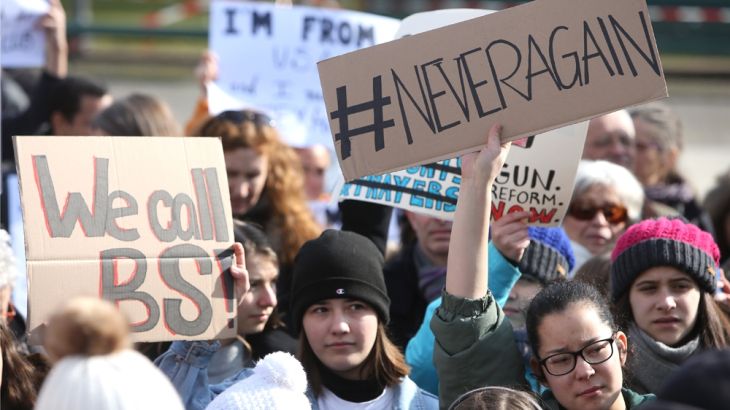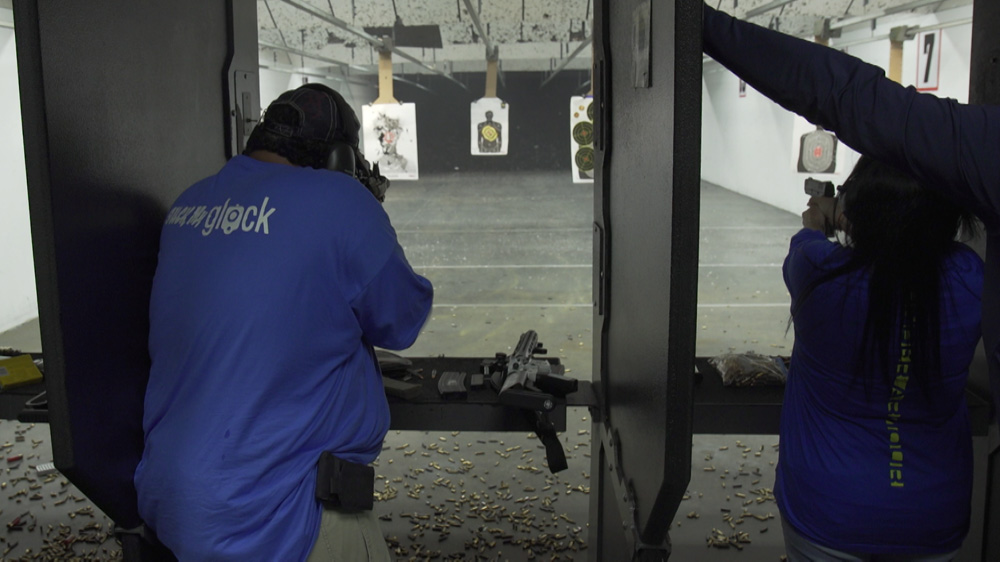
Never Again: America’s Battle of the Bullets
How surviving a high school mass shooting has turned some students into activists for and against US gun control reform.
On February 14, 2018, a 19-year-old gunman opened fire at Marjory Stoneman Douglas High School in Parkland, Florida, killing 17 people. The shooting was the deadliest in the history of high school shootings in the United States.
It triggered a movement of young people protesting against the lack of gun control across the country, and major cities worldwide, including Berlin, London, Rome and Sydney, culminating in the March for Our Lives in Washington.
Keep reading
list of 4 itemsIsraeli settlers set fire to cars, homes of Palestinians under occupation
Gunmen kill at least 11 in two attacks in Pakistan’s Balochistan
A knotty question of parent liability in the Crumbley school shooting case
“We are fighting for our voices to be heard because we do not want to see any other student get hurt by a bullet in their own school,” says Marjory Stoneman Douglas student Carlos Rodriguez at a student protest at the House of Representatives in Tallahassee, Florida.
The National Rifle Association of America’s (NRA’s) response to the March for Our Lives included a clip posted to the organisation’s official YouTube channel calling the protest “a march to burn the constitution” and “one-sided, logic-deprived and intellectually dishonest”.
Before the Marjory Stoneman Douglas High School Public Safety Act was signed into law by Florida Governor Rick Scott, a staunch NRA supporter, the minimum age to buy a gun was 18 years. The act has changed this to a 21-year-old age minimum.
The NRA immediately appealed the change, calling it unconstitutional. Scott has also called for an increased law enforcement presence in all schools, echoing President Donald Trump’s response to the shooting which included potentially arming teachers.
“There was a discussion going around, a couple of months after the Stoneman Douglas shooting happened, that teachers should be able to be armed,” says 17-year-old high school student Kyla Rivera. “I like the idea personally, but there’s a lot of teachers who have democratic mindsets, ‘No I don’t want to shoot a gun’ and kids who are like ‘The teachers could shoot us’… that is such an idiotic mindset.”
“A few weeks ago, we had a lockdown at my school. We didn’t know what was going on. We were stuck in a closet for an hour and a half… from that point on, all you can do is hide in a corner.”
As views vary on the Second Amendment right to bear arms, even from within the Stoneman Douglas community, a debate about disproportionate media coverage to address the issues with gun control has also arisen. While shootings at predominantly white schools continue to garner significant media exposure, poorer more prevalently black neighbourhoods face the same issues but without the attention of the global media.
“Inner city school kids don’t worry about what’s going to happen inside school. Outside of school is where we look [and say], ‘Oh, now I’ve got to survive outside of school’,” says high schooler Jeremiah Johnson.
With high school shootings averaging one a week in the United States, Never Again follows students, teachers and parents to find out what is behind this epidemic of violence and how this generation is taking it upon themselves to end it.
FILMMAKER’S VIEW
By Ladan Anoushfar
The story starts in a perfect American suburb in Florida.
On a perfect lawn under a glaring sun, sprinklers rhythmically dance to the left and then to the right; their choreography giving birth to a miniature rainbow.
Large houses and oversized cars populate the street. A flag proudly beats the thick tropical air, shining with all the stars the US has to display to any adventurous passer-by.
It is a perfect scene; a perfect picture of a perfect life, in a perfect suburb – yet this is where on February 14, 2018, a 19-year-old entered a high school and opened fire killing 17 people and injuring another 17.
Americans' relationship with guns is not a rational one, and most of the people I came across treated their weapons as one would a religious icon.
When I read about the incident, I was struck by the fact that high school shootings, that typically American brand of 21st-century horror story, are treated in a completely different way from other mass killings in public spaces.
Media coverage of these attacks never labels the perpetrator a terrorist nor an extremist despite the devastation they cause being on the same scale. Instead, the people who carry out these attacks are labelled mentally defective – and the country moves on. But why is it that these tragedies, which occur at the very heart of American society, rarely give rise to any questioning about what causes them?
I wanted to make a film that explored this phenomenon, and ask some of the difficult questions – why are these shootings so common? How do they affect society? And what is the effect on the children whose lives are affected – both directly and indirectly – by this violent trend?
When I looked deeper into the subject, the numbers I came across were frightening. In 2018 alone, there has been one school shooting a week on average. But despite the fact that school shootings such as Marjory Stoneman Douglas or Sandy Hook shake society at a deep level, they are not the ones that kill the most.
In fact, many more people have been shot by police officers in the past six years. There are also more people killed in gang-related shootings. Could all these phenomena be linked? I wanted to find out.
![Student survivors from Marjory Stoneman Douglas High School arrive at a rally for gun control reform on the steps of the state capitol, in Tallahassee, Florida [The Associated Press]](/wp-content/uploads/2018/03/814c819d770d48268b1cb8046c75bdbf_18.jpeg)
What I observed in the US is a paradox. On the one hand, there is the desire to be at the forefront of everything, displaying the image of a highly efficient society. On the other hand, the attitudes of certain sections of American society seem reminiscent of the era when the Second Amendment was written, when a trained militia used bayonets to maintain order. The result is a society in which a 19-year-old is able to access a military assault rifle.
Americans’ relationship with guns is not a rational one, and most of the people I came across treated their weapons as one would a religious icon.
American culture seems intimately familiar to the rest of the world thanks to films and TV, but as I drove past cheerfully advertised gun stores and saw whole families arriving at the firing range for a fun day out, I realised it’s a world apart.
There was tangible unease around the subject of gun control. The moment I mentioned the topic of our documentary, the atmosphere changed and people became tight-lipped. Interviewees who had agreed to talk to us got cold feet at the last minute.

However, the main drive for making this film was the student reaction to the Parkland shooting that led to the March for Our Lives movement. This time, something was different. The ‘Never Again’ hashtag seemed to represent the anger and frustration of a generation that wants change, full of hope and energy and who are not scared to demand what they believe in.
Luckily we managed to find several eloquent teenagers who agreed to share their views on this hugely divisive subject. From activist and vlogger Carlos who recorded the horrific events at Marjory Stoneman on his camera, to 17-year-old Kyla who has been firing guns since the age of seven, each teenager brought something new to my understanding of the gun control debate and the climate of fear and insecurity endured by young people.
What was clear, though, was that all of the teenagers wanted the same thing – to consign these mass school shootings to history. The ‘March for our Lives’ movement and its millions of supporters seemed to be gaining momentum with their calls for more gun control. But on the other side of the debate are Kyla and her dad, who would like to see teachers armed – an idea echoed by many in the gun lobby and President Donald Trump.
So far the question of how to prevent another high school massacre like Marjory Stoneman remains unanswered, as Carlos observes, “I think we all realised that politics are slower than we imagined.”
But that isn’t stopping this new generation who are determined to play a part in shaping their future by coming together and mobilising.